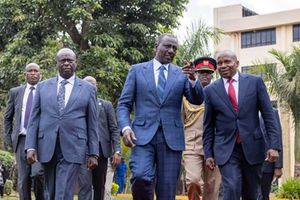
The Nation Centre building located along Kimathi Street, Nairobi.
| File I Nation Media GroupOur Columnists
Premium
How ‘Nation’ newsroom led the way in ending the colour bar
The British colonialists introduced apartheid-like separate development in Kenya. In Nairobi, Europeans lived in their designated suburbs, went to their whites-only schools and used whites (or Europeans) only toilets.
They wined and drank in whites-only restaurants, golf clubs and other sports clubs and some in some Catholic churches sat in the front pews reserved for “whites only”. Anglican churches were “whites only” to a large degree. In the offices, the white man was the boss and the rest of us were their humble servants.
Asians like me were happy to do their own thing in their own style in their own designated areas. It was the same for the “First Nations peoples” of Kenya, except they knew one day the British would be forced to leave the country. In the meantime, separate development reigned.
In 1960, the political winds of change were howling throughout Africa and the promise of independence was gaining momentum with each day. Kwame Nkrumah had already become the first African leader to dance with the Queen at Ghana’s Independence Day celebrations.
One of the first hints of a multiracial Kenya came with the birth of the Sunday Nation, Taifa Leo and Daily Nation. Suddenly, a newsroom full of Asians, Africans, Europeans and other nationalities was beginning a new kind of life, free from the colour bar. Mutual respect was the new order of the day and we were slightly gobsmacked to see for ourselves that not all white people were purebred racists.
Michael Curtis, the managing director, set the benchmark for staff inter-relations. He was kind and courteous to everyone. He was also the driving force behind the Nation House newspapers’ drive towards majority rule. No one had to be told twice, everyone celebrated that initiative.
We all worked together, drank together (at the Sans Chique and the Starlight Club), ate together at various restaurants and did things that were denied us during the decades of racial segregation. Suddenly the coffee “boy” was no longer a boy, Bwana Peter and Bwana Karo were not just drivers ... we were all part of a team and each demanded equal respect.
However, the locally employed journalists like me never really achieved equal pay. Overseas journalists were on special rates even though the Kenya Union of Journalists fought hard to win parity. Still, it was thank heaven for small mercies. Yes, the foreign journalists were stupefied when they heard a grown man was the family “houseboy”. A chap called David Levine once asked Gerry Loughran about the man who was working in the house he was staying in: “How can I call him the houseboy? He is old enough to be my grandfather!”
On the other hand, the new arrivals were hated by the local whites, they were treated as pariahs. Gerry Loughran wrote in his book about the question he was asked: “How long will you be staying?”
“What we new arrivals did not expect was the hostility which greeted us from most of the white establishment and from some of our media competitors—not the slaves at the typewriters, but their bosses, irritated by the challenge to their comfortable lives and the long domination of the market. They considered us a bunch of ignorant parvenus,” John Bierman (founding editor of the Nation) recalled.
The only English daily in the country and thus our great competitor was the long-established broadsheet, the East African Standard. When its managing director, Charles Thetford, met his new opposite number from the Nation he advised him: “Don’t bother to unpack your bags.” His fuming opponent, Frank Patrick retorted: “I will make you regret that remark.” Patrick said this encounter was the motivating factor throughout his career at the Nation.
While our English imports were opening our eyes to a new kind of freedom, Kenyans at Nation House were showing off their own journalistic talents, creativity and style. Three men stood out in the early days of the Nation and Taifa Leo. George Mbuggus was a live-wire editor and took the Swahili paper to new heights almost with every edition. Boaz Omori was the first African editor-in-chief of both English newspapers. I am particularly biased because he gave me the chance to break into foreign news and travel the world. Hilary N’gweno was probably the greatest editor of his day. He was the man who convinced both the Daily and Sunday Nation to stop “thinking white”, and “writing white” and to start meeting the needs of Kenyans.
From the very first day, all three newspapers had supported Kenyan independence but Kenyans’ newspaper needs were slightly different from Fleet Street. N’gweno asked the Nation executives to learn what was important to the majority of Kenyans and create a Kenyan product, not a Fleet Street lookalike.
The crunch came with the Congo uprising (in Michael Curtis’ own words), the murder of Patrice Lumumba in 1961 and the landing of Belgian troops. Belgian refugees poured into Nairobi. The Western news agencies were preoccupied (like their readers) with the fate of the Belgian and American missionaries. Ng’weno tactfully but firmly reminded his staff that the death of thousands of fellow Africans—whether in civil strife or at the hands of the hated mercenaries—was as an important consideration in terms of news priorities for an African newspaper with a majority of African readers. It was the day when a Kenyan newspaper became an African newspaper.
For a 16-year-old with only primary education, becoming a journalist was beyond my wildest dreams and whoever, or whatever, I am today, I owe it to every man, woman and youth who worked at the Nation from 1960 to 1978. Tom Clarke, Peter Moss, Brian Marsden, Trevor Grundy, Loughran, Jack Beverly, Joe Rodrigues, Allen Armstrong, John Bierman (who believed in me and gave me the job off-the-streets), Harry Sambo, George Mbuggus, John Tidey, Bob Muthusi, Philip Ochieng, Joe Kadhi, Mike Chester (who was wrongly deported), John De Villiers, Sammy Githegi (who died very young and was a brilliant journalist), Francis Raymond, and thousands more whose names escape in the twilight of my life.
Thanks to all the white journalists who treated everyone in the newsroom and the adjoining offices as human beings, my days at Nation House will always remain the happiest of my life. These memories are made even more beautiful by all the Kenya journalists who played a great part in my development as a journalist.
We, Asians and Africans, had been conditioned into keep the white folks at bay, never venturing into their restaurants, sports fields, churches, speaking to them, challenging a point of view or forcing the point that we are all equal. From that very first day at Nation House in 1960, I was born free even though uhuru was three years away. I have a long list of people I remember in my prayers. Rest in peace my rafiki, Gerry Loughran.
- Fernandes, who was among the first local journalists to be employed by the Nation, left in 1978 as Chief Reporter and is now based in Sydney, Australia



